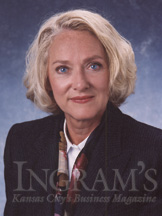players
targeting the notables and quotables of
kansas city

Irene Cumming, president and CEO of KU Med Center, wants to get the word
out—this is not your father’s hospital. Your father is welcome
here, of course, but the medical center has experienced a generation of
change in the six years she’s been in charge. What was a university
hospital run under the burden of state-agency operating regulations began
to metamorphose into a state-of-the-art, patient-focused regional health
center on Oct. 1, 1998, the day the hospital became an independent entity.
Since then, Cumming says, "Patient satisfaction scores have soared."
During her tenure, KU Med’s Level I Trauma facility has become the
only one in the metropolitan area, or northeast Kansas for that matter,
to receive certification from the American College of Surgeons. The hospital
dominates in the area of deep brain stimulation therapy, which uses implants
to control movement disorders—it performs more than twice as many
of the surgeries than any other medical center in the U.S. And it has
steadily stitched back together its cardiology program. It has been approved
to reopen its heart
transplant program, dead since 1995, and it is evaluating its options
for building a new heart hospital.
While leading her institution to new levels of care and respectability,
Cumming has also led it to new levels of profitability. In a time when
most academic health centers are losing money, the hospital in Kansas
City, Kan., saw net income for fiscal-year 2001 increase 75 percent, and
it will see growth close to that in 2002. Credit Cumming’s prior
experience as a CPA and audit partner of Pricewaterhouse and as chief
financial officer of the Medical College of Pennsylvania for her fiscal
responsibility.
But of all these accomplishments—many recognized regionally if not
nationally—Cumming is most proud of KU Med’s new role in Kansas
City. "We really have brought back to the community," she says,
"the true essence of an academic health center."